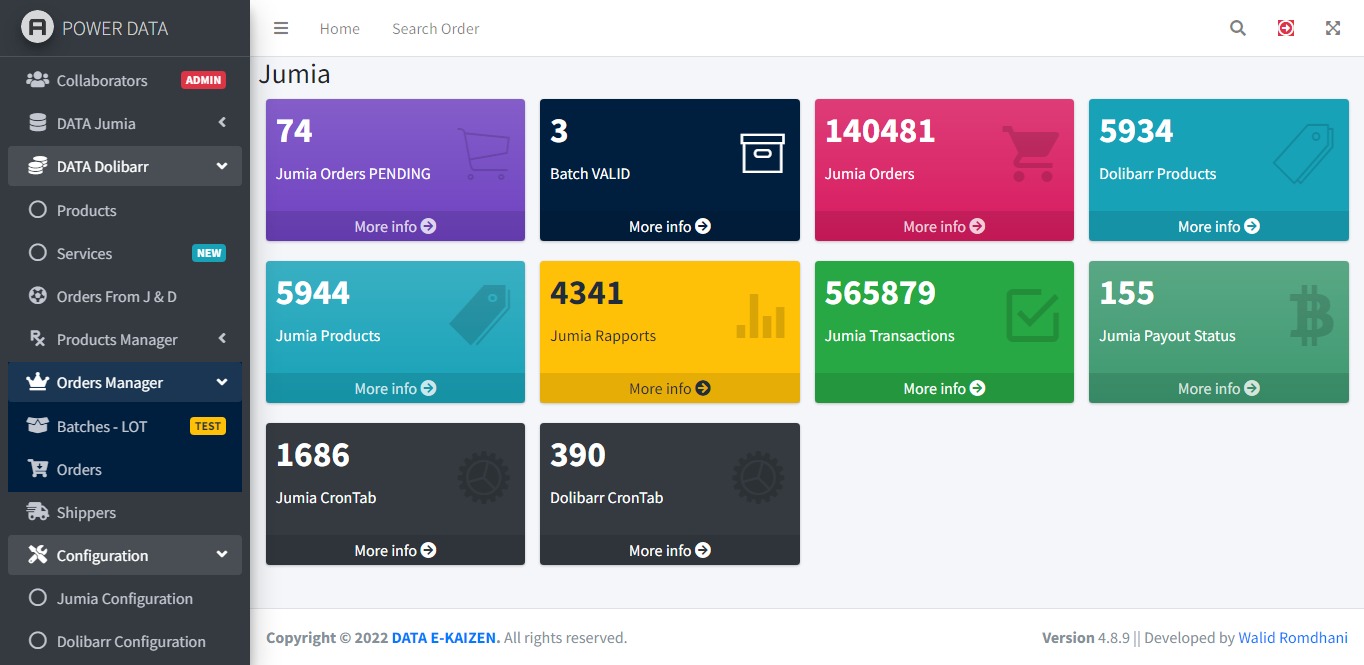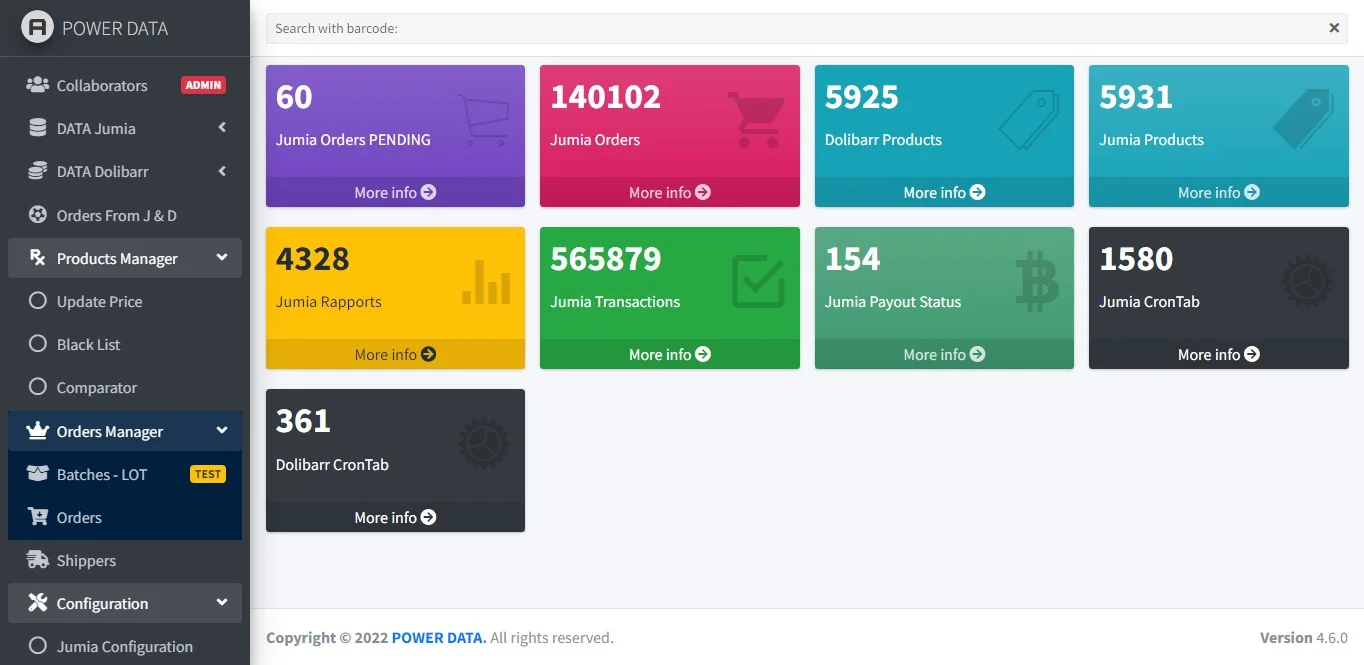

Project information
- Category: Web Application
- Client: The Factory
- Project date: July, 2022
Informations sur le projet
- Categorie: Application Web
- Client: The Factory
- Date de projet: Juillet, 2022
Projekt Information
- Kategorie: Web-Applikation
- Kunde: The Factory
- Projektdatum: Juli, 2022
Web application POWER DATA
The Factory is a wholesale and retail company selling products of different categories (e.g. cosmetics, electronics, etc.) and in different sales channels.
The Factory manages its business through many systems and platforms such as marketplaces, ERP, e-commerce sites and traditional sales.
This decentralization negatively influences the performance of the company and its team. And this can be caused for example by a lack of coordination or not sharing the necessary data at the right time.
The solution was therefore to develop a platform, which plays the role of an orchestra conductor to consolidate the process of assembling and coordinating the different activities of the company in a single database and also centralize the management of the different platforms. These objectives are then set to achieve this goal:
- Centralization of data by offering a single database for the analysis part.
- Automation of tasks and minimization of manual operations.
- Optimization of time when managing packages from different channels.
- Provide a configuration panel.
-
Preparation of data to be integrated into the PowerBi software:
- Importing data through the Jumia API (processed orders, products, invoices...) and automating these imports using a CRON job.
- Import of transactions data from excel files.
- Identification and calculation of the position ratio of the seller compared to the competitor for each product using a scraping script and CRON jobs.
- Import of products from Dolibarr ERP CRM.
-
Synchronization between Dolibarr ERP and Selecenter Jumia through APIs to allow :
- The import of orders from Selecenter jumia to dolibarr to manage them manually on the platform.
- Modification of the status of orders in Selecenter after their processing.
- Managing product inventory in Selecenter from dolibarr through CRON tasks.
- Manual price management from dolibarr to selecenter.
- The implementation of a price comparison between the two systems.
-
Management of batches and orders :
- A synchronization with the ERP Dolibarr to allow the creation or modification of the status of orders.
- Batch management (a batch is a set of orders).
- Orders management that can be classified in two forms:
- those imported from Selecenter Jumia through the APIs (Jumia Batch).
- those from other channels (creation / import) (Simple batch).
- Management of the preparation phase of the packages (picking and checking).
- Shipping of packages by configuring the corresponding deliverer to ensure a successful shipment through the APIs.
-
Configuration Panel :
- Management of the platform users and their access rights.
- Logistic management by providing an API configuration interface with the delivery companies of First.
- Configuration interface offers the possibility to integrate the parameters of Jumia API and Dolibarr ERP.
- Interface to configure CRON tasks.
Technologies : Php, Symfony,MySQL, HTML, CSS, JavaScript,Jquery,Ajax, Bootstrap,XML, REST API, Tache Cron, Git, Dlibarr, PowerBi
Application web POWER DATA
The Factory est une société de vente en gros et en détail des produits de différentes catégories (exemple: cosmétique, électronique, etc…) et dans différents canaux de ventes.
The Factory gère son business à travers plusieurs systèmes et plateformes comme les marketplaces, les ERP, les sites e-commerce et les ventes traditionnelles.
Cette décentralisation influence négativement sur le rendement de la société et son équipe. Et cela peut être causé par exemple par un manque de coordination ou l’absence de partage des données nécessaires au bon moment.
La solution était donc de développer une plateforme, qui joue le rôle d’un chef d'orchestre pour consolider la démarche visant à rassembler et à coordonner les différentes activités l'entreprise dans une base de données unique et aussi centraliser la gestion des différentes plateformes. Ces objectifs sont alors fixés à cette fin:
- Centralisation des données en offrant une seule base de données pour la partie Analyse.
- Automatisation des tâches et minimisation des actions manuelles.
- Optimisation du temps de gestion des colis provenant de différents canaux.
- Mettre à disposition une zone de configuration.
-
Préparation des données á intégrer dans le logiciel PowerBi :
- Importation des données à travers l’API Jumia ( les commandes traitées, les produits, les factures… ) et l’automatisation de ces importations à l’aide d’une tâche CRON.
- Importation des données relatives aux transactions depuis des fichiers excel.
- Identification et calcul des rapports de position du vendeur par rapport au concurrent pour chaque produit en utilisant un script de scraping et des tâches CRON.
- Importation des produits depuis le Dolibarr ERP CRM.
-
Synchronisation entre le ERP Dolibarr et Selecenter Jumia á travers les APIs pour permettre :
- L’importation des commandes depuis Selecenter jumia á dolibarr pour les gérer manuellement sur la plateforme.
- Modifier le statut des commandes dans Selecenter après leur traitement.
- La gestion du stock des produits dans Selecenter from dolibarr à travers des tâches CRON.
- La gestion manuelle des prix depuis dolibarr vers selecenter.
- La mise en place d'un comparateur des prix entre les deux systèmes.
-
La gestion des lots et des commandes :
- Une synchronisation avec l’ERP Dolibarr pour permettre la création ou la modification du statut des commandes.
- La gestion des lots ( un lot est un ensemble de commandes ).
- La gestion des commandes qui peuvent être classífiées sous deux formes:
- ceux qui sont importées depuis Selecenter Jumia à travers les APIs (Lot Jumia).
- ceux provenant d’autres canaux (création / importation ) (Lot Simple) .
- La gestion de la phase de préparation des colis ( picking et checking).
- L'envoi des colis en configurant l'expéditeur correspondant pour garantir une bonne expédition à travers les API.
-
Zone de configuration :
- Une gestion des utilisateurs de la plate-forme et leurs droits d'accès.
- Une gestion logistique en mettant en disposition une interface de configuration des API avec les sociétés de livraison de First.
- Interface de configuration des paramètres d'intégration des API Jumia et l’ERP Dolibarr.
- Interface de configuration des tâches CRON.
Technologies : Php, Symfony,MySQL, HTML, CSS, JavaScript,Jquery,Ajax, Bootstrap,XML, REST API, Tache Cron, Git, Dlibarr, PowerBi
POWER DATA Web-Applikation
The Factory ist ein Groß- und Einzelhandelsunternehmen, das Produkte verschiedener Kategorien (z. B. Kosmetika, Elektronik usw.) über unterschiedliche Vertriebskanäle verkauft.
The Factory verwaltet sein Business über viele Systeme und Plattformen wie Marktplätze, ERP, E-Commerce-Seiten und den traditionellen Verkauf.
Diese Dezentralisierung wirkt sich negativ auf die Leistung des Unternehmens und seines Teams aus. Dies kann z. B. durch mangelnde Koordination oder die fehlende Möglichkeit, die erforderlichen Daten zum richtigen Zeitpunkt zu teilen, verursacht werden.
Die Lösung bestand daher darin, eine Plattform zu entwickeln, die die Rolle eines Orchesterdirigenten spielt, um den Prozess der Zusammenstellung und Koordinierung der verschiedenen Aktivitäten des Unternehmens in einer einzigen Datenbank zu konsolidieren und auch die Verwaltung der verschiedenen Plattformen zu zentralisieren. Um dieses Ziel zu erreichen, werden folgende Ziele verfolgt:
- Zentralisierung der Daten durch Bereitstellung einer einzigen Datenbank für den Analyseteil.
- Automatisierung der Aufgaben und Minimierung der manuellen Tätigkeiten.
- Optimierung der Zeit für die Verwaltung von Paketen aus verschiedenen Kanälen.
- Bereitstellung eines Konfigurationspanels.
-
Vorbereitung der Daten für die Integration in die PowerBi-Software:
- Importieren von Daten über die Jumia API (verarbeitete Bestellungen, Produkte, Rechnungen...) und Automatisieren dieser Importe über einen CRON-Job.
- Import von Transaktionsdaten aus Exceldateien.
- Identifizierung und Berechnung des Positionsverhältnisses des Verkäufers im Vergleich zum Mitbewerber für jedes Produkt mithilfe eines Scraping-Skripts und CRON-Jobs.
- Import von Produkten aus Dolibarr ERP CRM.
-
Synchronisierung zwischen Dolibarr ERP und Selecenter Jumia über APIs, um :
- Den Import von Bestellungen aus Selecenter Jumia in Dolibarr, um sie manuell auf der Plattform zu verwalten.
- Änderung des Status von Bestellungen in Selecenter nach deren Bearbeitung.
- Verwaltung des Produktbestands in Selecenter von dolibarr aus durch CRON-Aufgaben.
- Manuelle Preisverwaltung von dolibarr zu Selecenter.
- Die Implementierung eines Preisvergleichs zwischen den beiden Systemen.
-
Verwaltung von Chargen und Bestellungen :
- Eine Synchronisation mit dem ERP Dolibarr, um die Erstellung oder Änderung des Status von Bestellungen zu ermöglichen.
- Batch-Verwaltung (ein Charge ist eine Gruppe von Aufträgen).
- Bestellungen Verwaltung können in zwei Formen klassifiziert werden:
- die aus Selecenter Jumia über die APIs importierten (Jumia Charge).
- die aus anderen Kanälen (Erstellung / Import) (Einzelcharge).
- Verwaltung der Vorbereitungsphase der Pakete (picking und checking).
- Versand von Paketen durch Konfiguration der entsprechenden Zusteller, um einen erfolgreichen Versand über die APIs zu gewährleisten.
-
Konfigurations-Panel :
- Verwaltung der Benutzer der Plattform und ihrer Zugriffsrechte.
- Logistische Verwaltung durch Bereitstellung einer API-Konfigurationsschnittstelle mit den Zustellern von First.
- Die Konfigurationsschnittstelle bietet die Möglichkeit, die Parameter von Jumia API und Dolibarr ERP zu integrieren.
- Schnittstelle zur Konfiguration von CRON-Aufgaben.
Technologien : Php, Symfony,MySQL, HTML, CSS, JavaScript,Jquery,Ajax, Bootstrap,XML, REST API, Tache Cron, Git, Dlibarr, PowerBi
